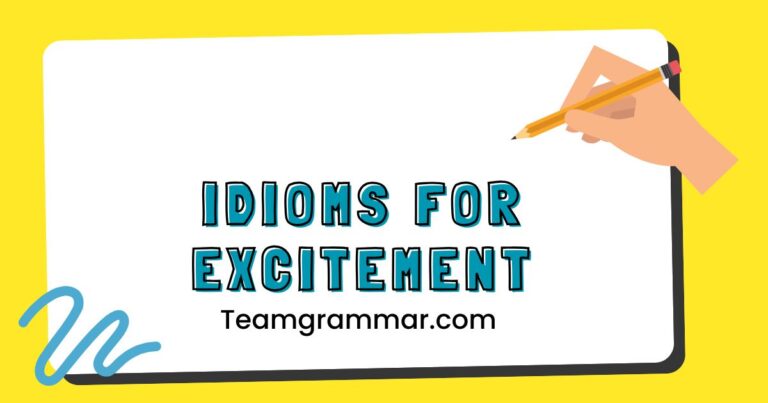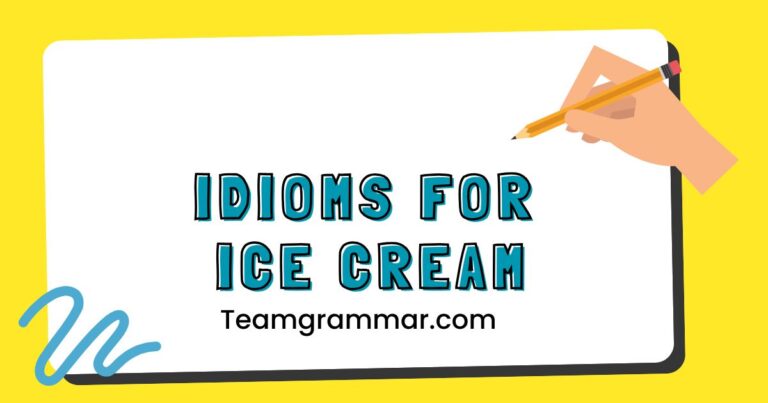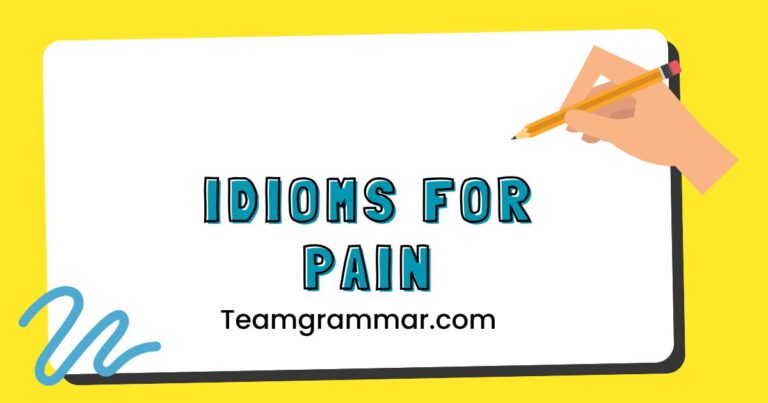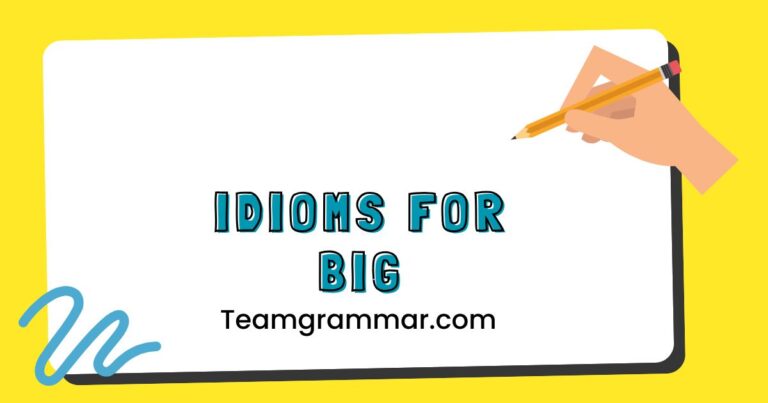41 Dream On: Mastering Common Idioms About Dreams
Idioms add color and depth to the English language, allowing speakers to express complex ideas in concise and evocative ways. When it comes to dreams, a topic rich with symbolism and personal meaning, idioms are particularly abundant and useful.
Understanding idioms related to dreams not only enhances your comprehension of the English language but also allows you to communicate more effectively and creatively. This article delves into the world of dream-related idioms, providing definitions, examples, usage rules, and practice exercises.
This guide is perfect for English language learners, writers, and anyone looking to enrich their vocabulary and understanding of idiomatic expressions.
By exploring these idioms, you’ll gain a deeper appreciation for the nuances of English and be better equipped to express yourself with greater precision and flair. Whether you’re describing your aspirations or reflecting on past experiences, these idioms will provide you with the tools to articulate your thoughts and feelings in a more engaging and meaningful way.
Let’s embark on this journey to unlock the power of dream idioms.
Table of Contents
- Introduction
- Definition of Dream Idioms
- Structural Breakdown
- Types and Categories of Dream Idioms
- Examples of Dream Idioms
- Usage Rules for Dream Idioms
- Common Mistakes with Dream Idioms
- Practice Exercises
- Advanced Topics
- FAQ
- Conclusion
Definition of Dream Idioms
Idioms are expressions whose meanings cannot be understood from the literal meanings of the individual words they comprise. Instead, an idiom’s meaning is figurative and culturally specific. Dream idioms are a subset of idioms that use the concept of “dreams” – whether literal dreams during sleep or figurative dreams representing aspirations – to convey a particular message or feeling.
Dream idioms can be classified based on their function and the context in which they are used. They often serve to: emphasize a point, add humor or irony, simplify complex ideas, and connect with the listener or reader on an emotional level.
These idioms are deeply embedded in the English language and are used in everyday conversations, literature, and media.
The context of a dream idiom is crucial for its accurate interpretation. The same idiom can convey different meanings depending on the situation and the speaker’s intent.
For example, the idiom “dream on” can be used sarcastically to dismiss someone’s unrealistic expectations or as a playful encouragement to pursue a challenging goal.
Structural Breakdown
The structure of dream idioms can vary, but they often follow common idiomatic patterns. Some are phrases, while others are clauses or even complete sentences.
Understanding the structural elements of these idioms can help in recognizing and using them correctly.
Many dream idioms involve verbs related to dreaming, such as “dream,” “imagine,” or “aspire.” These verbs are often combined with prepositions, adjectives, or nouns to create the idiomatic meaning. For example, “to dream up” combines the verb “dream” with the preposition “up” to mean “to invent or create something new.”
Other dream idioms might not explicitly use the word “dream” but still relate to the concept of aspirations or fantasies. These idioms often employ metaphors and similes to convey their meaning.
For example, “pie in the sky” uses the image of a desirable but unattainable reward to represent unrealistic expectations.
The grammatical structure of these idioms typically adheres to standard English grammar, even though their meaning is non-literal. They can be used in various tenses and can be modified to fit the context of the sentence.
However, it’s important to note that some idioms have a fixed structure and cannot be altered without losing their idiomatic meaning.
Types and Categories of Dream Idioms
Dream idioms can be categorized based on the specific aspect of “dreams” they relate to. Here are some common categories:
Idioms About Aspirations and Goals
These idioms express hopes, ambitions, and long-term objectives. They often convey a sense of optimism and determination.
Idioms About Unrealistic Expectations
These idioms highlight plans or ideas that are impractical or unlikely to succeed. They often carry a tone of skepticism or disappointment.
Idioms About Success and Achievement
These idioms celebrate accomplishments and the realization of dreams. They often emphasize the effort and dedication required to achieve success.
Idioms About Inaction and Procrastination
These idioms describe situations where dreams remain unfulfilled due to a lack of action or effort. They often convey a sense of regret or missed opportunities.
Idioms About Fantasy and Imagination
These idioms relate to the realm of make-believe and imaginative thinking. They often describe scenarios that are detached from reality.
Examples of Dream Idioms
Below are extensive examples of dream idioms, organized by category, to illustrate their usage and meaning in various contexts.
Aspirations and Goals Examples
These idioms express hopes, ambitions, and long-term objectives. They often convey a sense of optimism and determination.
The following table showcases idioms related to aspirations and goals, providing example sentences to illustrate their usage in context.
| Idiom | Meaning | Example Sentence |
|---|---|---|
| Follow your dreams | Pursue your goals and aspirations | She decided to follow her dreams and become a professional artist. |
| Dream big | Have ambitious goals | The motivational speaker encouraged the audience to dream big and never give up on their aspirations. |
| Set your sights on | Aim for a specific goal | He set his sights on becoming a doctor and worked tirelessly to achieve his goal. |
| Reach for the stars | Try to achieve something great | Even though it seemed impossible, she decided to reach for the stars and apply to her dream university. |
| Have your heart set on | Desire something strongly | She had her heart set on traveling the world after graduation. |
| A dream come true | A wish fulfilled | Winning the championship was a dream come true for the entire team. |
| Live the dream | Enjoy a successful and fulfilling life | After years of hard work, he was finally living the dream in his beachfront property. |
| Dream of | Imagine or aspire to | She always dreamed of becoming a veterinarian and working with animals. |
| Hopes and dreams | Aspirations and ambitions | The young entrepreneurs shared their hopes and dreams for the future of their company. |
| See your dreams realized | Witness your goals come to fruition | He worked diligently to see his dreams realized, and eventually, he achieved all his goals. |
| Chase your dreams | Actively pursue your goals | It’s important to chase your dreams, even when faced with obstacles. |
| Make your dreams a reality | Turn your aspirations into something tangible | Through dedication and hard work, she managed to make her dreams a reality. |
| Follow your heart | Pursue what you are passionate about | He decided to follow his heart and pursue a career in music, despite the challenges. |
| Aim high | Set ambitious goals | The coach always encouraged his players to aim high and strive for excellence. |
| Keep your eyes on the prize | Stay focused on your goal | Despite the setbacks, she kept her eyes on the prize and eventually achieved her objective. |
| The sky’s the limit | There are no boundaries to what you can achieve | With her talent and determination, the sky’s the limit for her future success. |
| Reach for the moon | Try to achieve something extraordinary | He encouraged his team to reach for the moon, even if it seemed impossible. |
| Shoot for the stars | Aim for something great | She always told her children to shoot for the stars and never settle for mediocrity. |
| Aspire to | Have a strong desire to achieve something | Many young artists aspire to have their work displayed in prestigious galleries. |
| Visualize success | Imagine achieving your goals to motivate yourself | Before each competition, the athlete would visualize success to boost her confidence. |
| Build castles in the air | Make plans that are not likely to happen | They spent hours building castles in the air, planning a vacation they could not afford. |
| Hitch your wagon to a star | Associate yourself with someone successful to improve your own chances | By hitching his wagon to a star, the young intern quickly gained valuable experience. |
| See visions of | Imagine a future scenario | The entrepreneur saw visions of a successful company before he even started the business. |
Unrealistic Expectations Examples
These idioms highlight plans or ideas that are impractical or unlikely to succeed. They often carry a tone of skepticism or disappointment.
The table below provides idioms that describe unrealistic expectations, accompanied by example sentences to illustrate their application in various contexts.
| Idiom | Meaning | Example Sentence |
|---|---|---|
| Dream on | Used sarcastically to dismiss unrealistic expectations | “You think you’ll win the lottery? Dream on!” |
| Pie in the sky | An unrealistic or unattainable goal | Their plan to build a colony on Mars is just pie in the sky. |
| Castles in the air | Impractical plans or fantasies | He spends too much time building castles in the air instead of focusing on real-world problems. |
| Pipe dream | A hope or plan that is unlikely to be realized | Her ambition to become a famous actress was just a pipe dream. |
| Living in a dream world | Being out of touch with reality | He’s living in a dream world if he thinks he can get that job without any experience. |
| Head in the clouds | Being impractical and unrealistic | She always has her head in the clouds and rarely pays attention to details. |
| A fool’s paradise | A state of illusory happiness | He was living in a fool’s paradise, unaware of the financial troubles looming ahead. |
| A flight of fancy | A whimsical or unrealistic idea | His plan to sail around the world single-handedly was just a flight of fancy. |
| Wishful thinking | Believing something because you want it to be true, not because it is likely | Thinking they will win the game without practicing is just wishful thinking. |
| Delusional | Holding unrealistic beliefs or fantasies | He’s delusional if he thinks he can become a professional athlete at his age. |
| A fool’s errand | A task that has no hope of success | Sending him to negotiate with that company is a fool’s errand; they will never agree. |
| Chasing rainbows | Pursuing something unattainable | She’s always chasing rainbows, looking for the perfect job that doesn’t exist. |
| False hope | A belief that something positive will happen when it is unlikely | The doctor gave them false hope about the treatment’s effectiveness. |
| Illusory | Based on illusion; not real | The promise of quick riches turned out to be an illusory dream. |
| A mirage | Something that appears real but is not | The idea of retiring early was just a mirage, given their financial situation. |
| Grasping at straws | Desperately trying anything to find a solution, even if it’s unlikely to work | They are grasping at straws trying to save the failing business. |
| Building sandcastles | Creating something that is not likely to last | Their business plan was like building sandcastles, easily destroyed by the first wave of challenges. |
| A fool’s dream | A dream that is unrealistic or impossible to achieve | Believing he could win the race without training was a fool’s dream. |
| Living in denial | Refusing to accept reality | He was living in denial about his gambling addiction. |
| Out of touch | Not aware of what is happening in reality | The politician seemed out of touch with the struggles of ordinary citizens. |
| Far-fetched | Unlikely and unconvincing | The plot of the movie was too far-fetched to be believable. |
| A fool’s errand | A pointless task | Trying to convince him to change his mind is a fool’s errand. |
| An illusion | A false idea or belief | The promise of easy money was just an illusion. |
| Living a fantasy | Believing in something that is not real | She was living a fantasy, imagining a perfect life that didn’t exist. |
Success and Achievement Examples
These idioms celebrate accomplishments and the realization of dreams. They often emphasize the effort and dedication required to achieve success.
The subsequent table presents idioms related to success and achievement, with example sentences illustrating their application in different contexts.
| Idiom | Meaning | Example Sentence |
|---|---|---|
| Dreams do come true | Achieving what you hoped for is possible | After years of hard work, she proved that dreams do come true. |
| Achieve your dreams | Successfully reach your goals | With dedication and perseverance, you can achieve your dreams. |
| Realize your ambitions | Make your aspirations a reality | He worked tirelessly to realize his ambitions and become a successful entrepreneur. |
| Fulfill your potential | Develop your abilities to the fullest | The program aims to help students fulfill their potential and succeed in life. |
| Make it big | Become very successful | She dreamt of moving to Hollywood and making it big as an actress. |
| Hit the jackpot | Have a great success or stroke of luck | They hit the jackpot when their startup was acquired by a major company. |
| On top of the world | Feeling extremely happy and successful | After winning the championship, the team felt like they were on top of the world. |
| Come up roses | End successfully, often unexpectedly | Despite the initial challenges, the project came up roses in the end. |
| A resounding success | A complete and undeniable success | The charity event was a resounding success, raising a significant amount of money. |
| Reap the rewards | Enjoy the benefits of hard work | After years of dedication, he finally began to reap the rewards of his efforts. |
| Triumph over adversity | Overcome challenges and achieve success | The athlete triumphed over adversity to win the gold medal. |
| Make a name for yourself | Become well-known and respected | She worked hard to make a name for herself in the competitive industry. |
| Reach the pinnacle | Reach the highest point of success | He finally reached the pinnacle of his career after years of dedication. |
| Go places | Be successful in the future | With her talent and drive, she is sure to go places. |
| A dream start | A very successful beginning | The team got off to a dream start, winning their first five games. |
| Turn the tide | Reverse a negative trend and achieve success | They managed to turn the tide and save the company from bankruptcy. |
| Breakthrough | A significant discovery or achievement | The scientist made a major breakthrough in cancer research. |
| Scale new heights | Achieve new levels of success | The company continues to scale new heights, expanding its operations globally. |
| Make headway | Make progress towards a goal | The team is making headway on the project, despite the challenges. |
| Come a long way | Make significant progress over time | She has come a long way since she started learning English. |
| On the right track | Moving in a direction that will lead to success | The project is on the right track and should be completed on time. |
| Riding high | Experiencing a period of success | The tech company is riding high after the successful launch of their new product. |
| On the upswing | Improving or increasing in success | The economy is on the upswing after a period of recession. |
Inaction and Procrastination Examples
These idioms describe situations where dreams remain unfulfilled due to a lack of action or effort. They often convey a sense of regret or missed opportunities.
The table below lists idioms that address inaction and procrastination, accompanied by example sentences to illustrate their usage in different situations.
| Idiom | Meaning | Example Sentence |
|---|---|---|
| Let your dreams die | Fail to pursue your goals | He let his dreams die because he was afraid of failure. |
| Missed the boat | Missed an opportunity | He missed the boat on investing in that company when it was just starting out. |
| Lost opportunity | A chance that has been wasted | Not learning a new language was a lost opportunity for him. |
| Sleep on it | Postpone a decision until the next day | I’m not sure what to do; I think I’ll sleep on it. |
| Put off until tomorrow | Procrastinate | He always puts off until tomorrow what he could do today. |
| Idle dreams | Unrealistic or impractical aspirations | He spent his days indulging in idle dreams instead of taking action. |
| Daydreaming | Being lost in thought, often about unrealistic scenarios | She was caught daydreaming in class instead of paying attention. |
| Rest on your laurels | Rely on past successes instead of continuing to work hard | He rested on his laurels after his first success and failed to innovate. |
| Let the grass grow under your feet | Waste time and not take action | Don’t let the grass grow under your feet; start working on your goals now. |
| Sitting on your hands | Doing nothing when action is required | The government is sitting on its hands while the economy suffers. |
| Inaction speaks louder than words | Lack of action reveals true intentions | His inaction speaks louder than words; he clearly doesn’t care about the project. |
| Apathy | Lack of interest or concern | The voters showed apathy towards the election, resulting in low turnout. |
| Stuck in a rut | Being in a monotonous and unfulfilling routine | He felt stuck in a rut and decided to make a career change. |
| A dead end | A situation with no possibility of progress | Their negotiations reached a dead end, with neither side willing to compromise. |
| Going nowhere | Making no progress | The project is going nowhere due to lack of funding and support. |
| Spinning your wheels | Expending effort without making progress | They were just spinning their wheels trying to fix the problem without proper tools. |
| Marking time | Doing something without making real progress | He was just marking time at his job, waiting for a better opportunity. |
| On the back burner | Given low priority | The project was put on the back burner due to budget constraints. |
| Procrastinate | Delay or postpone action | Many students procrastinate studying until the last minute. |
| Hesitate | Pause before doing something, especially because of uncertainty | Don’t hesitate to ask for help if you need it. |
| Get cold feet | Become nervous and withdraw from a plan or action | He got cold feet before the wedding and almost called it off. |
| Second thoughts | Doubts about a decision | She had second thoughts about accepting the job offer. |
| Waver | Be indecisive or uncertain | He began to waver in his commitment to the project. |
Fantasy and Imagination Examples
These idioms relate to the realm of make-believe and imaginative thinking. They often describe scenarios that are detached from reality.
The table below offers idioms associated with fantasy and imagination, accompanied by example sentences that illustrate their usage in diverse contexts.
| Idiom | Meaning | Example Sentence |
|---|---|---|
| Lost in a dream | Engrossed in fantasy or imagination | She was lost in a dream, imagining herself as a famous singer. |
| Dream up | Invent or imagine something | He dreamed up an elaborate plan for their vacation. |
| A figment of your imagination | Something that exists only in your mind | The monster under the bed was just a figment of his imagination. |
| Make-believe | Pretending or imagining | The children were playing make-believe in the backyard. |
| A world of your own | Living in a fantasy or imaginative state | She seems to live in a world of her own, detached from reality. |
| In your mind’s eye | In your imagination or memory | He could see the scene vividly in his mind’s eye. |
| Stretch the imagination | Challenge the ability to imagine or believe something | The plot of the movie really stretched the imagination. |
| A flight of fancy | A whimsical or imaginative idea | His plan to build a robot butler was just a flight of fancy. |
| Whimsical | Playful and fanciful | The artist created a whimsical painting filled with fantastical creatures. |
| Imaginative | Having a vivid imagination | The child was very imaginative and loved to create stories. |
| Fanciful | Overly imaginative and unrealistic | The novel was filled with fanciful tales of dragons and magic. |
| Living in a fantasy world | Believing in something that is not real | He was living in a fantasy world, imagining himself as a superhero. |
| Invent | Create or design something new | She invented a new game for the children to play. |
| Concoct | Create or devise something, especially a story or plan | He concocted an elaborate excuse for being late. |
| Fabricate | Invent or create something, typically with deceitful intent | She fabricated a story to avoid getting in trouble. |
| Made-up | Invented or imagined | The children were playing with made-up characters and stories. |
| Conjure up | Create or imagine something, often with effort | He tried to conjure up a solution to the problem. |
| Visionary | Thinking about the future with imagination and wisdom | The entrepreneur was a visionary, foreseeing the future of technology. |
| Envision | Imagine as a future possibility; visualize | He could envision a future where everyone had access to clean energy. |
| Muse | Be absorbed in thought | She would often muse about the meaning of life. |
| Lost in thought | Deeply thinking about something | He was lost in thought, contemplating the mysteries of the universe. |
| A mental picture | An image in one’s mind | He had a mental picture of his dream home. |
| Pure imagination | Something that is entirely created in one’s mind | The story was a product of pure imagination. |
Usage Rules for Dream Idioms
Using dream idioms correctly requires understanding their specific meanings and contexts. Here are some general rules to follow:
- Context is key: Pay attention to the situation and the speaker’s intent to interpret the idiom accurately.
- Word order: Some idioms have a fixed word order that cannot be changed without altering their meaning.
- Tense and verb form: Use the appropriate tense and verb form to match the context of the sentence.
- Cultural understanding: Be aware that some idioms may have different connotations or meanings in different cultures.
- Formality: Consider the level of formality when using idioms, as some may be more appropriate for informal settings.
Common Mistakes with Dream Idioms
Here are some common mistakes to avoid when using dream idioms:
| Incorrect | Correct | Explanation |
|---|---|---|
| She dreamed on winning the lottery. | She dreamed of winning the lottery. | “Dream on” is a dismissive idiom, while “dream of” expresses aspiration. |
| He had his head in the clouds, so he achieved his dreams. | He worked hard, and as a result, he achieved his dreams. | “Head in the clouds” implies unrealistic expectations, which is contradictory to achieving dreams. |
| They are building castles in the sky and that’s why they are so successful. | They are dreaming big, and that’s why they are so successful. | “Building castles in the sky” means unrealistic and impractical planning, which doesn’t lead to success. |
| He is living the pipe dream and not working hard. | He has a pipe dream and is not working hard. | “Living the pipe dream” is not a common idiom. “Has a pipe dream” is more appropriate. |
| She missed the boat because she was on top of the world. | She missed the boat because she was procrastinating. | “On top of the world” means successful and happy, which is not a reason to miss an opportunity. |
Practice Exercises
Test your understanding of dream idioms with these practice exercises.
Exercise 1: Fill in the Blanks
Complete the following sentences with the appropriate dream idiom from the word bank below.
Word Bank: dream on, follow your dreams, pie in the sky, a dream come true, head in the clouds
- Winning an Olympic gold medal was __________ for her.
Answer: a dream come true - If you think you can get rich without working, __________.
Answer: dream on - She decided to __________ and become a professional dancer.
Answer: follow your dreams - His idea of building a self-sustaining city on Mars is just __________.
Answer: pie in the sky - He has his __________ if he thinks he can pass the exam without studying.
Answer: head in the clouds
Exercise 2: Multiple Choice
Choose the correct meaning of the idiom in each sentence.
- He told her to reach for the stars. What does this mean?
- To try to grab stars from the sky.
- To aim for something great.
- To travel to outer space.
Answer: b. To aim for something great.
- They are always building castles in the air. What does this mean?
- They are constructing elaborate sandcastles.
- They are making impractical plans.
- They are architects designing buildings.
Answer: b. They are making impractical plans.
- She missed the boat on the investment opportunity. What does this mean?
- She arrived late for a boat trip.
- She missed an opportunity.
- She prefers traveling by plane.
Answer: b. She missed an opportunity.
- After years of hard work, he is finally living the dream. What does this mean?
- He is asleep and dreaming.
- He is enjoying a successful and fulfilling life.
- He is always fantasizing about the future.
Answer: b. He is enjoying a successful and fulfilling life.
- He is just spinning his wheels trying to fix the problem. What does this mean?
- He is driving a car.
- He is expending effort without making progress.
- He is exercising on a bicycle.
Answer: b. He is expending effort without making progress.
Exercise 3: Sentence Completion
Complete each sentence using a suitable idiom related to dreams.
- Despite the challenges, she decided to __________ and pursue her lifelong ambition.
Answer: follow her dreams - He is so unrealistic; he always has his __________.
Answer: head in the clouds - After winning the championship, the team felt like they were __________.
Answer: on top of the world - Don’t __________; start working on your goals today.
Answer: let the grass grow under your feet - The monster under the bed was just ___________.
Answer: a figment of his imagination
Advanced Topics
For those looking to delve deeper into the subject of dream idioms, consider exploring the following topics:
- Historical Evolution: Research the origins and historical context of specific dream idioms.
- Cross-Cultural Comparisons: Compare dream idioms in English with similar expressions in other languages.
- Literary Analysis: Analyze how authors use dream idioms to enhance their writing and convey deeper meanings.
- Psychological Interpretations: Explore the psychological implications of dreams and their connection to idiomatic expressions.
- Contemporary Usage: Investigate how dream idioms are evolving and being used in modern media and conversations.
FAQ
Conclusion
Mastering dream idioms can significantly enhance your understanding and use of the English language. By learning the definitions, usage rules, and common mistakes associated with these idioms, you can communicate more effectively and expressively.
Whether you’re describing your aspirations, reflecting on past experiences, or exploring the realm of imagination, dream idioms provide a rich and colorful vocabulary to articulate your thoughts and feelings. Continue to practice and explore these idioms to unlock their full potential and enrich your linguistic skills.







